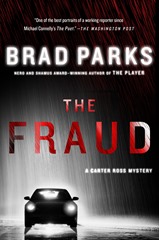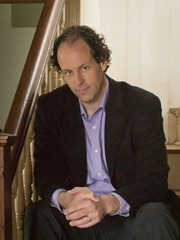Today I welcome my friend and fellow ITW member Brad Parks as our guest blogger. Brad takes on one of the most elusive yet essential elements in successful storytelling. Read on to find the answer.
—————————–
Once upon a writer’s conference, a friend of mine—who might or might not be Chantelle Aimee Osman, depending on how she feels about being described as my friend—was going around, asking folks a great question:
In Hollywood, people talk about certain actors or actresses having an “It Factor,” that special something that just draws in the eye and won’t let it go. Is there an It Factor with writing; and, if so, what is It?
I answered with one word: Voice.
Voice, I will posit, is the writing equivalent of a killer body, great hair and a mysteriously alluring smile.
And while I volunteered to take this guest blog spot from Joe because I have a new book to  flog—it’s called THE FRAUD, and when I’m flattering myself I think it’s a fine example of a healthy narrative voice—I want to take a few minutes of your blog time to unpack this subject, because it strikes me as one that folks in the writeosphere don’t spend enough time discussing.
flog—it’s called THE FRAUD, and when I’m flattering myself I think it’s a fine example of a healthy narrative voice—I want to take a few minutes of your blog time to unpack this subject, because it strikes me as one that folks in the writeosphere don’t spend enough time discussing.
Which is strange. Ask any editor or agent what they’re looking for in a manuscript, and a strong, fresh, unique voice is inevitably at or near the top of that list. The same is true for readers, even if they might not be able to articulate it as such.
The proof can be found at the top of the bestseller list. I’m willing to bet I could kidnap you, drag you into the desert, beat you with sage brush and leave you to die in the brutal sun; but, if before I departed, I also left you with a stripped paperback that began…
I was arrest in Eno’s Diner. At twelve o’clock. I was eating eggs and drinking coffee. A late breakfast, not lunch. I was wet and tired after a long walk in heavy rain. All the way from the highway to the edge of town.
… you’d be like, “Oh, cool. Reacher.” (Or at least you would if you were a Lee Child fan, as I am).
Many of the writers whose book sales are counted in the millions have voices that are so distinct, you could wipe their names and all other identifying characteristics from their work, and yet most of us would still be able to identify their prose within a few paragraphs.
Think of Harlan Coben (where suburban suspense meets Borsht Belt shtick); or Sue Grafton (who couldn’t pick Kinsey’s chatter out of a crowd?); or James Lee Burke (you can hear Louisiana in everything that falls out of Robicheaux’s mouth); or Elmore Leonard, or Laura Lippman, or… or…
It starts with voice. And, yes, of course the writers I’ve listed do many other things well, whether it’s Coben’s great twists or Lippman’s great characters or what have you. But I would argue that voice also covers the things they don’t necessarily do well. Because when a writer has a strong voice? The reader is already buckled in, happy to be along for the ride.
This is great news for all of us who attempt to prod words into compliance. Because unlike Hollywood, where the It Factor is at least partially based on things you have to be born with—some marriage of facial symmetry, bone structure, and that certain crinkle around the eyes—voice is something that can be developed.
Let’s start from 30,000 feet up, with a simple definition of what it is we keyboard-ticklers do each day. Writing is nothing more than (and nothing less than) the task of transferring thoughts from your brain to paper.
It sounds simple enough, except when you start out, there’s this thick filter between your head and the page. And, depending on how tortured your formal education might have been—and how many misguided English teachers forced you to write keyhole-style essays or said you couldn’t end sentences in a preposition—the filter can stay thick for many years.
But if you keep working the writing muscle, the filter starts to thin out. The thoughts get to the page more readily than they did before. You start to notice little things that are dragging on your prose and you eliminate them. You read great writers and incorporate the things they do so well. You read your stuff out loud and develop an ear for what sounds clunky and what sounds cool.
Eventually, the filter disappears. Then it’s just you, in all your idiosyncratic genius. And if you accept that no two people’s thoughts are the same—yes, you really are that special snowflake—no two writers’ voices will be the same, either. Ergo, you will be that strong, fresh, unique voice that someone out there is looking for.
And, no, none of this happens particularly quickly. If you thought I was going to offer the equivalent of a miracle diet for writers—Lose 30 Pounds And Gain Your Voice In Two Easy Weeks, Guaranteed!—I’m sorry to report no such thing exists.
Personally? I started writing for my hometown newspaper when I was 14 years old and I didn’t start to develop a whimper of a voice until I was at least 19. Even then, it was probably just a subconscious imitation of the writers I admired. I didn’t start to have a voice of my own until I was probably 24. Well, okay, maybe 26.
Admittedly, I’m not the quickest study. I’m sure a brighter light could find their voice faster than I did. But, perhaps, only by a little. Writing is a journey without shortcuts, because the destination only becomes clear to you after you’ve arrived.
But at the end of this particular road, the voice—that It Factor—is waiting for you. Fact is, it’s been inside you all along, screaming to get out.
 Brad Parks is the only author to have won the Shamus, Nero and Lefty Awards. His sixth thriller featuring investigative reporter Carter Ross released yesterday. For more, visit www.BradParksBooks.com.
Brad Parks is the only author to have won the Shamus, Nero and Lefty Awards. His sixth thriller featuring investigative reporter Carter Ross released yesterday. For more, visit www.BradParksBooks.com.
